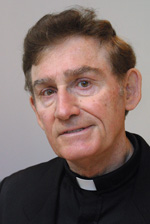A flame fueled by bubbles of gas rising through water in a star-shaped fountain greets visitors as they enter the new American Veterans Disabled for Life Memorial in Washington, D.C. This powerful icon symbolizes the healing, cleansing quality of water with the enlightening and tempering power of the eternal fire.
The memorial doesn’t glorify war but focuses on its pity. Surrounding the fountain are tall panes of glass, some with images of disabled men and women. One pane reads, “In war, there are no unwounded soldiers.”
I frequent our Armed Forces Retirement Home in Washington, D.C., and have seen the physical and psychological trauma soldiers suffer. Sleep that is supposed to bring peace of mind brings instead nightmares. Even though it’s idealized in some movies, war is a living hell.
The new memorial is sobering but not depressing. An inscription by Dr. Hampar Kelikian reflects on the courage needed by those in war’s aftermath: “We start by not thinking so much anymore about what you have lost. You must think about what you have left … and what you can do with it.”
[hotblock]
Kelikian reminds us that those who have been hurt physically or otherwise can sidestep the paralysis of self-pity, think positively and realize they have much to contribute to life with the gifts they still possess.
Etched on another pane of glass at the memorial site, a quote from former senator and disabled veteran Bob Dole identifies the most important antidote for coping with a crisis:
“In the end, what gets people through a physical or emotional crisis is not new technology or medication. Those things can help, of course. But it’s faith that gives you the strength to endure — faith that won’t allow you to give up; faith that manifests itself in a ferocious determination to take the next step — the one that everyone else says is impossible.”
In Washington, D.C., we have quite a few war memorials, including the Vietnam Veterans Memorial, the Korean War Veterans Memorial and a touching memorial to military nurses called the Vietnam Women’s Memorial that resembles the Pieta. Like Mary, one of the female nurses in the memorial is holding a wounded man in her arms while two others surround him.
When visiting each of the memorials, the expectation is to be respectfully quiet, to meditate and to pray.
As I left the memorial, I couldn’t help but think of the apostles who ask Christ how they should pray. Christ answers by reciting the Lord’s Prayer. Remembering our disabled veterans is yet another way to pray. They descended into hell as Christ did, and they hope once again to enjoy the resurrected life he won for us. May that hope grow strong and sustain them, Amen.
PREVIOUS: Praise the Lord by remembering everything he has done for us, pope says
NEXT: All wars begin in a jealous heart; let go of pride, envy, pope says




Share this story